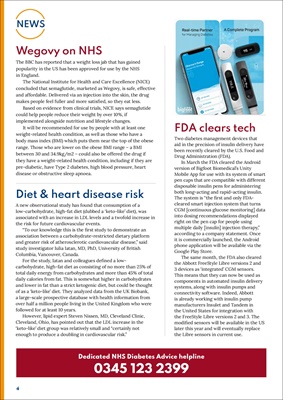
4
NEWS
Wegovy on NHS
The BBC has reported that a weight loss jab that has gained
popularity in the US has been approved for use by the NHS
in England.
The National Institute for Health and Care Excellence (NICE)
concluded that semaglutide, marketed as Wegovy, is safe, effective
and affordable. Delivered via an injection into the skin, the drug
makes people feel fuller and more satisfied, so they eat less.
Based on evidence from clinical trials, NICE says semaglutide
could help people reduce their weight by over 10%, if
implemented alongside nutrition and lifestyle changes.
It will be recommended for use by people with at least one
weight-related health condition, as well as those who have a
body mass index (BMI) which puts them near the top of the obese
range. Those who are lower on the obese BMI range - a BMI
between 30 and 34.9kg/m2 - could also be offered the drug if
they have a weight-related health condition, including if they are
pre-diabetic, have Type 2 diabetes, high blood pressure, heart
disease or obstructive sleep apnoea.
Diet & heart disease risk
A new observational study has found that consumption of a
low-carbohydrate, high-fat diet (dubbed a 'keto-like' diet), was
associated with an increase in LDL levels and a twofold increase in
the risk for future cardiovascular events.
"To our knowledge this is the first study to demonstrate an
association between a carbohydrate-restricted dietary platform
and greater risk of atherosclerotic cardiovascular disease," said
study investigator Iulia Iatan, MD, PhD, University of British
Columbia, Vancouver, Canada.
For the study, Iatan and colleagues defined a lowcarbohydrate,
high-fat diet as consisting of no more than 25% of
total daily energy from carbohydrates and more than 45% of total
daily calories from fat. This is somewhat higher in carbohydrates
and lower in fat than a strict ketogenic diet, but could be thought
of as a 'keto-like' diet. They analyzed data from the UK Biobank,
a large-scale prospective database with health information from
over half a million people living in the United Kingdom who were
followed for at least 10 years.
However, lipid expert Steven Nissen, MD, Cleveland Clinic,
Cleveland, Ohio, has pointed out that the LDL increase in the
'keto-like' diet group was relatively small and "certainly not
enough to produce a doubling in cardiovascular risk."
FDA clears tech
Two diabetes management devices that
aid in the precision of insulin delivery have
been recently cleared by the U.S. Food and
Drug Administration (FDA).
In March the FDA cleared the Android
version of Bigfoot Biomedical's Unity
Mobile App for use with its system of smart
pen caps that are compatible with different
disposable insulin pens for administering
both long-acting and rapid-acting insulin.
The system is "the first and only FDAcleared
smart injection system that turns
CGM [continuous glucose monitoring] data
into dosing recommendations displayed
right on the pen cap for people using
multiple daily [insulin] injection therapy,"
according to a company statement. Once
it is commercially launched, the Android
phone application will be available via the
Google Play Store.
The same month, the FDA also cleared
the Abbott FreeStyle Libre versions 2 and
3 devices as 'integrated' CGM sensors.
This means that they can now be used as
components in automated insulin delivery
systems, along with insulin pumps and
connectivity software. Indeed, Abbott
is already working with insulin pump
manufacturers Insulet and Tandem in
the United States for integration with
the FreeStyle Libre versions 2 and 3. The
modified sensors will be available in the US
later this year and will eventually replace
the Libre sensors in current use.
Dedicated NHS Diabetes Advice helpline
0345 123 2399